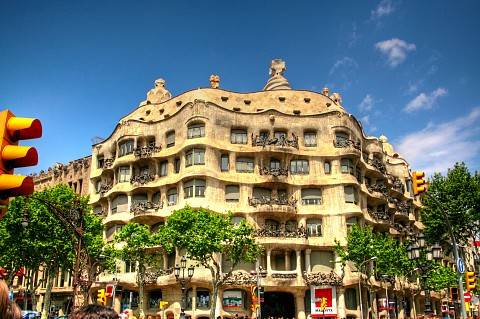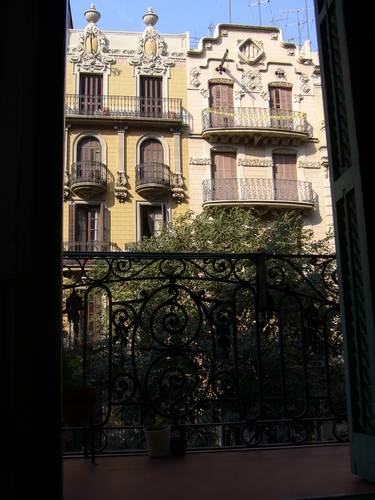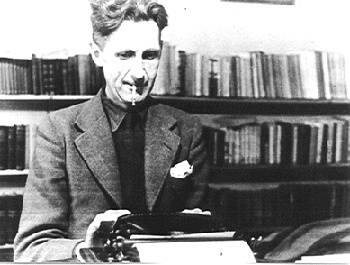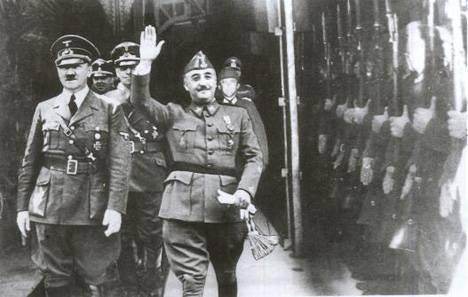IN THE DYNAMIC
 Nina and I met a few interesting characters last week in a dive tapas bar in Figueres, Spain, home of Salvador Dali and his amazing Teatre-Museu Dali, which he built toward the end of his life in the old theater bombed out in the war against Franco’s fascists
Nina and I met a few interesting characters last week in a dive tapas bar in Figueres, Spain, home of Salvador Dali and his amazing Teatre-Museu Dali, which he built toward the end of his life in the old theater bombed out in the war against Franco’s fascists
The joint, called the Dynamic Café Bar, is shabbily decked out in a mid ’60s U.S. pop art style mixed with ’70s pancake house. White Formica, chocolate brown leather booths, and orange trim everywhere. Weird. Especially when you enter after walking through the baroque, modernisme, and, in Figueres at least, surrealistic forms that dominate the bourgeois towns of Catalunya.
At the Dynamic, the San Miguel on tap was very, very cold (it’s not a beer you would want to drink at any other temperature), and the tapas were better than any you’d find at the tonier or hipper places down in Barcelona. Dolores, the proprietress behind the bar, spoke no Ingles so she introduced us to Roman, who was washing down some fine-looking patatas bravas with a rioja, so that he could help me decipher the Catalan menu.
In time we are sitting in a booth with Roman, who is a hairdresser originally from Dusseldorf who moved to Catalunya 15 years prior to be with his partner, a Catalan, also in the booth. Also present is a heavily tattooed woman from England and Austria who had moved to the area years ago. So it was a wonderful night of drinks and tapas and conversation with worldly folk about our various countries, customs, foods, art, criminal justice systems, agriculture and politics. Museums and such are wonderful when travelling abroad, but this is the kind of experience that really rewards us Americanos.
No one knew where Illinois was of course, let alone Champaign-Urbana, although Chicago rang a bell. All had traveled but, to my surprise, they had little interest in visiting the U.S., and no interest in C-U, once we described the area. It may have just been an anomaly, for I’ve never before run into a European who didn’t want to come to the U.S.
IN FIGUERES AND BARCELONA

The part of my identity known as American citizen began to feel a bit isolated from world currents. It started that night in Figueres. Our new friends were decent and polite, but occasionally something would bubble to the surface about other Americanos they had met who were sort of dopey or self-involved, or a sense that they saw America itself as increasingly unhinged, or just not that important anymore.
You start noticing things. There are very, very few American cars, and virtually none that are for sale in the states. (I did see a few Jeeps, but technically these days they’re Italian). It makes California look like Michigan in terms of domestic car levels. There are very few American products period. A trip to the Super-Mercado (well, that’s  American at least) found Philly Cream Cheese and Jack Daniels and that’s about it. Of course, the tentacles of U.S. fast food culture are penetrating everywhere. It’s not hard to find a Dunkin’ Donuts, KFC, or Burger King in the cities or even mid-sized towns, but they are still far outnumbered by the thousands of local hole-in-the-wall joints that are everywhere. I didn’t check the banks for American financial “products.” If they were smart they didn’t buy any.
American at least) found Philly Cream Cheese and Jack Daniels and that’s about it. Of course, the tentacles of U.S. fast food culture are penetrating everywhere. It’s not hard to find a Dunkin’ Donuts, KFC, or Burger King in the cities or even mid-sized towns, but they are still far outnumbered by the thousands of local hole-in-the-wall joints that are everywhere. I didn’t check the banks for American financial “products.” If they were smart they didn’t buy any.
You can get just about anywhere cheaply and easily on public transportation, although our train to Figueres was kind of slow. But this was because of construction for an adjacent new high-speed line connecting Barcelona to France. The electric railway systems are amazingly quiet and efficient. And Spain is investing mucho Euros (one of which will now cost you about a buck fifty in limpid USD) in expanding them.
IN THE HOTEL ROOM, IN BARCELONA
The usual native language Euro channels were on the cable in our digs in Barcelona, but also quite a few news channels in English: the BBC of course, but also Al Jazeera, a Moscow station, and something from Korea. And CNBC, God help us all. The differences in perspectives and interests can be quite startling. In our limited viewing we noticed Moscow is very interested in resources, oil and gas, aluminum, salt mines in Poland, etc.; The BBC spends a lot of time on India, particularly the fast-rising middle classes who are going to take your job; Korea seemed fascinated with pan-Asian pop culture. And CNBC. Analysis of polling numbers on Obama’s popularity (why do I think of junior high school?), what’s going on with Conan and Jay, and unbelievably, the still-employed Jim Cramer spouting off.
Al Jazeera is most interesting. Of course there’s plenty about the latest Israeli brutalities, but also David Frost interviews, reports from the Philippines on the sorry state of the police there, interviews with Arab filmmakers, and a show that focuses on media itself, particularly American media. I missed the show, but the gist of the promo was: Why is American media so terrible, and are the American people ignorant dupes because of it? Shots of people like Glenn Beck appear. I’d really like to get Al Jazeera on our local cable. Free exchange of ideas and all that. Fat chance.
You don’t see people walking and texting and eating and drinking coffee while texting and talking on the phone while walking in the eternal present that is not quite what Baba Ram Dass imagined. Time is different here and multi-tasking is not yet hegemonic. You sit to have a coffee, and you enjoy it. Then you walk.
 Our friends Jerry and Joyce take the train up from Sitges, where they often spend time, to have lunch with us in Barcelona. Wandering around, we walk into a little store about the size of the Walnut Street Tea Company, full of various local salamis and sausages, several grades of ham hanging from the ceiling, oils, inexpensive good local wines, and so forth. It’s the kind of place to supplement the fantastic Boquerias, or large open markets scattered about the city, which people walk to and through to pick up their produce, cut-on-site meats, poultry, fish, bread, and every other food. Jerry is agitated and asks why can’t we have something like this in Urbana, or even in Chicago. I dig what he’s asking but also the larger unstated question. Why can’t we have a goddamn culture?
Our friends Jerry and Joyce take the train up from Sitges, where they often spend time, to have lunch with us in Barcelona. Wandering around, we walk into a little store about the size of the Walnut Street Tea Company, full of various local salamis and sausages, several grades of ham hanging from the ceiling, oils, inexpensive good local wines, and so forth. It’s the kind of place to supplement the fantastic Boquerias, or large open markets scattered about the city, which people walk to and through to pick up their produce, cut-on-site meats, poultry, fish, bread, and every other food. Jerry is agitated and asks why can’t we have something like this in Urbana, or even in Chicago. I dig what he’s asking but also the larger unstated question. Why can’t we have a goddamn culture?
IN THE MEDIA
The day before heading home I’m reading the Financial Times in a bar just off the Placa George Orwell. Amazingly little U.S. news: something about Americans giving to Haitian relief despite the comments of Pat Robertson and Rush Limbaugh. (You can just see the editors who write the headline that focuses on the Right shaking their heads and going, “What the fuck is wrong with those people?” My thought is, “Is this worth a story? Do you really see us as that depraved?” Of course, this was before I got home and read some of the mainstream conservative opinion, which wasn’t all that different. I’m looking at you, David Brooks).
A long story about China notes that despite our self-satisfied delusions, the West is increasingly unpopular with the Chinese people. It seems the better they know us, the less they like us. There’s something about the rapidly rising Indian middle class who are going to take everybody’s jobs. A profile of the Goldman Sachs economist who coined the phrase BRIC countries (Brazil, Russia, India, China) notes how he realized that the future was not going to be American. Wall Street Banker Jamie Dimon testifies he has no idea when the recession will end, hinting that there’s some really bad shit still out there. An analysis says demand for risk is at pre-crisis levels already, but that there are signs that some country (Greece is the most likely) will default on its bonds, setting off a downward cascade similar to what the collapse of Lehman Brothers did. What happened to the Green Shoots that everyone at CNBC is so keen on?
I’d stay if I could, but I do miss home. Why, I don’t know. On the bus to the beautiful Barcelona airport, we strike up a conversation with an American couple across the aisle. They’re working their way back from Istanbul, headed home to Orlando. I note the little green Spartan logo on his shirt, and yes, he went to Michigan State, and yes we’re from Urbana, and no, neither of us knows who won the NCAA championship football game, or NFL playoff games, or even that Illinois and MSU are playing basketball just about then. Nor do we care. We talk about Istanbul and Barcelona. We’re not ready to start thinking about Orlando or Urbana, let alone domestic politics.
IN THE AIR
The flight is long: really lousy romantic comedies are shown, then even worse American sit-coms. I can’t watch. I read the flight magazine. As slight as usual, but there’s an interesting interview/story with Bill Ford (of Ford Motors) and Harrison Ford (of Indiana Jones and environmental perspective). At one point Bill Ford says the future is electric mass transport and Ford is going to be there. Harrison can only say, “Wow. ” Ford may be a flicker of U.S. hope. They seem to have their shit together in building a world car in the new Focus. But mass transit….? Wow.
 Layover in Atlanta and I’m depressed. Food is lousy. I wish I had tried to get some Catalan fuet salami or some fine Spanish jambon past the sausage-sniffing beagle leashed to those USDA jack-booted thugs at the baggage claim. CNN is on everywhere, and it seems infinitely stupid. Everyone is obese. The airport is charmless and dreary. The flight is delayed because the crew is missing. (Did they check the bar?). There is a whole family of loud fat idiots all in Harley gear who will also be on the flight to Bloomington. Probably my kin.
Layover in Atlanta and I’m depressed. Food is lousy. I wish I had tried to get some Catalan fuet salami or some fine Spanish jambon past the sausage-sniffing beagle leashed to those USDA jack-booted thugs at the baggage claim. CNN is on everywhere, and it seems infinitely stupid. Everyone is obese. The airport is charmless and dreary. The flight is delayed because the crew is missing. (Did they check the bar?). There is a whole family of loud fat idiots all in Harley gear who will also be on the flight to Bloomington. Probably my kin.
Finally under way. Just a couple of hours more, get car, drive to Urbana, get in own bed, sleep long time. “This is your captain speaking. I have a little bad news for you…. The Bloomington airport is fogged in and they’ve just lost their runway lights, so we’re going to land in Peoria.” ARRRRGGGHHH!!! We bang down in Peoria, and are told here is where you be. Seems there were mechanical problems when we came down. My guess, from the bouncing down the runway, is that our 18-year-old pilot (well, that’s what he looked like) destroyed the landing gear. But hell, you get what you pay for, and these feeder line pilots ain’t exactly getting rich.
IN LIMBO
Much confusion in the airport about what to do. Maybe a bus? When? “We’re working on that.” We find a guy who has just rented a car, and offer some money for a lift. Turns out he’s a CPA, young Asian guy who lives in San Diego, but got laid off and can’t find work there. He’s got a two or three month job doing an audit at State Farm and is thankful that he’s got some work, even though he’ll be away from his 6 and 9 year old kids and living in hotels and trying to find entertainment in Bloomington. We try to tell him of some things to do in B-N and C-U, but are not coming up with much.
So back in Urbana and catching up on the local news. MSU beats Illini. I still don’t care. Hearings about widening I-74 to Mahomet. (John McEnroe voice in my head: “You cannot be serious.”) A Tribune article about economic development potential of high-speed rail in Illinois. It’s positive, but you already know the end story… “We just can’t afford it now in these times” (as if other times were more propitious). We’re a poor country, much poorer than Spain. Huh? David Brooks has another column in the NY Times about the American character. As usual, it’s horseshit. As if Americans were rational instead of emotional basket cases who can’t begin to understand the forces that constrain their lives.
But I’m exhausted, and I suspect that colors my sense of just how exhausted our polity, economy and culture seem to be right now. Glenn Beck? You cannot be serious.
IN MEMORY OF ORWELL
 Homage to Catalonia is a book worth an occasional revisit (as are all of Orwell’s works), and this seems an appropriate time, since the 70th anniversary of the fall of Barcelona to the Nationalists, effectively ending the civil war, is this January 26.
Homage to Catalonia is a book worth an occasional revisit (as are all of Orwell’s works), and this seems an appropriate time, since the 70th anniversary of the fall of Barcelona to the Nationalists, effectively ending the civil war, is this January 26.
I like it that there’s a George Orwell plaza in Barcelona, even the irony of the security cameras there. The book itself is mostly a kind of travelogue of his experiences in Spain, going there as a journalist but soon joining the Republican cause. Spain then was a bit of backwater, and interest in it in the U.S., despite the few who formed the Abraham Lincoln Brigades to go fight for the loyalists there, was probably about as strong as my Dynamic Bar friends’ interest in the U.S.
 But it’s still a hot issue in some quarters. Old political grudges and struggles over the command of history and the tales we tell ourselves still work out. When I was in Spain three years ago, an article appeared in the Guardian by the elder and respected British historian Eric Hobsbawm that still was trying to defame Orwell’s account. We don’t have to get into the details of this ongoing, and often shrill, historical argument.
But it’s still a hot issue in some quarters. Old political grudges and struggles over the command of history and the tales we tell ourselves still work out. When I was in Spain three years ago, an article appeared in the Guardian by the elder and respected British historian Eric Hobsbawm that still was trying to defame Orwell’s account. We don’t have to get into the details of this ongoing, and often shrill, historical argument.
Suffice it to say that Orwell came out of the experience a committed democratic socialist (We’re talking about real socialists here, not corporate liberals like Obama that the imbecile American Right ignorantly brand socialist), and a committed anti-Stalinist, positions he maintained until the end of his life. He also emerged as someone who was acutely attuned to the deceits of language and propaganda, which led to 1984 and Animal Farm. The first chapter of Homage describes his arrival in Barcelona and his amazement at the eradication of the language and manners of servility. A later chapter bemoans the return of that language as the Republican forces collapse.
The war was not over when Homage was first published, but Orwell can already see that the Republic is a failed state. He knows the future government will be fascist, as his side will lose because of internecine conflict and the betrayals of the Republic’s chief funder, Stalin, who hijacked the Republic (Hobsbawm and others will dispute this). The Republic was exhausted. Spanish fascism, backed by the church, rural areas, conservatives, big business and the wealthy, with the backing of Hitler and Mussolini, was energized.
I’m not suggesting much of a parallel between Spain in the ’30s and the U.S. today. But Orwell can haunt one when in Catalunya. I’m also haunted by another Brit writer, George Monbiot of the Guardian, who recently wrote that the U.S. looked like a failed state in its inability to deal with climate change. Coming back to the health care debate debacle makes me think “failed state” is not an impossible event here. (I have not used Spanish health care, but Jerry had occasion to, and reports it is prompt, efficient, quite good, and fee-free). The country seems unhinged from reality, in a fantasy life, funding an empire with unsecured debt, and spouting nonsense. Yes we’re big and strong, and have great assets, at least the ones we haven’t squandered, like soil, and decent schools, but we have no idea how disconnected we are, or increasingly unimportant.
Only back a day and already I’m craving some good tapas or fuet and some civilization. The San Miguel? Eh, not so much. Many better American craft brews. At least Franco is still dead.








